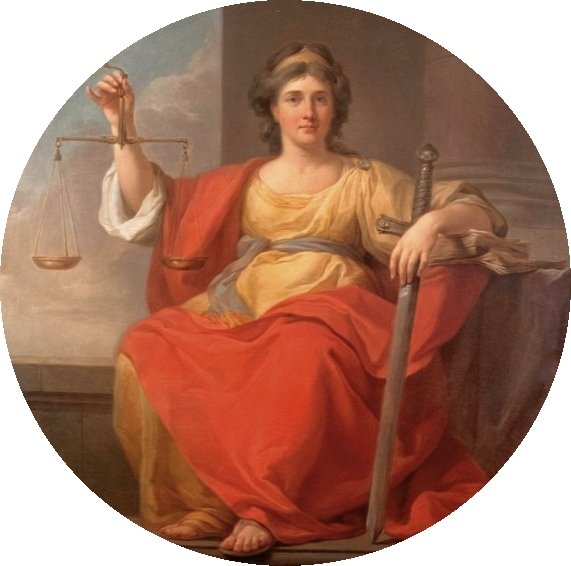Human beings are unique among creatures on this earth, for we have even deeper than the conscious, the very instinct of justice. Even without thought or much deliberation, a human can have the instinct for justice. This sense of justice brings rivalry among brothers, it brings favoritism, it brings inequality between the genders. On the other hand, the same sense of justice causes acts of sacrifice for a stranger, pity for the oppressed, and charity toward the impoverished man who seeks to work. Justice in its truest expression cannot be bound to an intellectual understanding of law codes or rules. Justice is instinct, intuition, principles, laws, conscience, and individual attention expressed in specific ways in the context of situations. Justice is spirit, mind, and heart satisfied with equilibrium. Justice is the unburdening.

The inner sense of right and wrong
We live in a time when external influences have an overbearing effect upon the inner workings of the human mind from even before the formation of conscious powers of determination. A pregnant woman might take certain medicines, or be exposed to factors in her environment that would affect the child growing within her. The child has no control over what happens to it, but the detrimental effects of external, man-made agents will alter this child. We might suppose by powers of science, we can make “improvements” even at genetic levels. But we don’t understand improvement in the context of a lifetime, or in the context of history, or of ages. What we can do is, make changes; improvement or degradation is determined over periods too long to be considered by the impatience of the human heart!
The inner sense of right and wrong that lies as potential within every person – regardless of how to varying degrees we have been affected by external factors – needs challenge, needs opportunity, needs nurturing, needs testing. The richness of experience from human living and exposure to information can give such varied influence, but we are admittedly living in a time of great uncertainty. Along with that, we are trained by technology to lack focus and patience. Impetuousness has become the great habit of a technology-driven race of humans. The nuance of justice and its far-reaching depth is all but lost to human thinking.
Even though the inner sense of right and wrong is well capable of instant judgment, it is not the final word in matters that span peoples of communities with vast inner differences. When people of many different kinds come together, there is bound to be copious variability. Where we tend to lack is, our desire for conformity and uniformity seeks to break down human individuality, and not build it up. We would modestly have to admit that, individual sense of right and wrong starts to break apart when the concept of “social justice” is introduced.
The sense of justice that emanates from belief
Beyond the inner sense of right and wrong, it is training in belief that defines, drives, and guides the sense of justice. There is an inner sense of justice, and at least the potential for it within all humans. As long as that inner sense of justice is there, it is a force to be utilized for the individual and common good. We must fear the day when that inner sense of justice is extinguished, the flames of it are doused by indifference.
When the question of beliefs arises, we are confronted by the biggest questions mankind has been facing; never has mankind faced these questions as it does now, though! Globalization succeeded on many fronts, but it always found culture as the final challenge.
Cultures contain the diversity of beliefs that mold what justice means to individuals, and that is where globalization finds limits.
Progressive societies have been those that held to a meaningful, positive belief. Adherence to that belief propelled the entire community forward in a direction that held justice to greatest importance. Even love in a community would falter if justice doesn’t have place. Justice will create and maintain the conditions necessary for benevolence to flourish; someone – a just leadership – would have to stand guard to keep everyone safe!
A progressive society though, is an ideal that can turn into something ruthless toward individuals that are not equipped to compete. They start to be perceived as impediments to progress. When such ones get left behind, society often moves ahead and the very justice we seek becomes the cause for social fragmentation. This social fragmentation, in the long run, would be the fertile ground for injustice to develop.
We must fear the day when that inner sense of justice is extinguished, the flames of it are doused by indifference.
Why do humans experiments with justice tend to fail?
Human experiments tend to fail because the ambition of the endeavor is rightly lofty, but human beings cannot sustain to that ideal in practical ways. Where humans start to see everything in terms of practicality, the failure is reduced but the ideal also fails. This is the ever-present challenge before humans – the conflict of ideals and practicality – and we are wise to admit that challenge rather than deny it.
Our pursuits, especially for social justice cannot be short-sighted. The gains made by haste will be abrupt and short-lived. It is better for justice to have depth in the social cause, and if it has depth it will also be slow. This is where an individual who recognizes personal responsibility rather than rights is most at advantage, and literally is ahead of society.
So often individuals rely on society and its leaders to establish and implement justice. The thinking is: as society will improve, individuals will improve. This kind of thinking is reverse logic, and a partial truth at best. The individual sense of responsibility is the precursor to justice, and the individual does well to recognize his or her own limitations in the social context. What typically happens these days is, individuals use social movement as a place to serve their individual rights gain prominence. The right to free speech is one such special case. The urge to have one’s voice heard and respected over all other voices – this can be utilized as an expression of justice, but it so often does not.
…an individual who recognizes personal responsibility rather than rights is most at advantage…
The merit of ideas over individuals
It is time that we accept without prejudice that, valuable ideas can come from anyone. We must train our senses to perceive and appreciate a good idea, wherever it may be found. This thinking will fundamentally alter what leadership means, and it will protect us from blindly following those with charisma.
There is much scope for personal freedom in the present society. The method of social interaction would have to change – perhaps with supervision from those interested in guarding the society – to accept internal, individual differences. Freedom allows for differences, but if it not checked, that individual freedom will create unmanageable friction and attrition. We will be faced with social weakening, and the possibility of decay.
We should look to the possibility of such a society where, individual strength is seen as an opportunity for society and not a threat.
The idea that can move individuals and societies toward justice can be appreciated. Those individuals who can carry meritorious ideas forward need to be recognized and supported. Their contribution should be remembered! In this time of change, we are also introduced to collection of the greatest variety of ideas ever to have come before humans. Confusion and opportunity, hopelessness and hope exist together. In this situation, especially if we recognize the unsustainability of our way of life and are mindful of the future generations, there is need to seek ways to preserve life as-well-as it can be.
There is much scope for preservation in the human mind because, justice leads to find ways to preserve what is good. Life is good! There is no good greater than life. It is the supreme gift from the Maker of mankind. If we, as individuals and as societies, can make life meaningful and useful by the power of ideas, then we need to harness all the power we can. Should we go in a direction that will lead to harm, consequences will be powerful enough to remind us! The worst thing human beings can do is, give up and surrender to destruction. WE MUST NOT.
